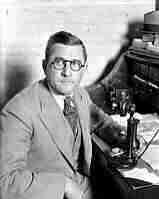Roy E. Steckel
| Roy Edmund Steckel | |
|---|---|
 Captain Roy E Steckel | |
| Born |
October 17, 1887 Nashville, Tennessee |
| Died |
November 14, 1950 (aged 63) Los Angeles, California |
|
Police career | |
| Department | Los Angeles Police Department |
| Country | United States |
| Years of service |
LAPD Chief 30 Dec, 1929 09 Aug 1933 |
| Rank |
Chief of Police |
Roy Edmund Steckel (October 17, 1887 – November 14, 1950) served as Los Angeles Police Department Chief of Police from December 30, 1929 to August 9, 1933. He succeeded and was succeeded as chief by James E. "Two-Guns" Davis. During Steckel's reign as Chief of Police, Los Angeles hosted the 1932 Summer Olympic Games. The L.A.P.D. employed 800 duly sworn police officers. According to the L.A.P.D.'s official site, crime was very low during the Olympics, with there being only "two robberies, eight burglaries, 39 thefts, and 10 auto thefts."[1]

Steckel was dismissed as chief by incoming mayor Frank L. Shaw, who had run on a platform that included a plank calling for Steckel's dismissal. Under Steckel's regime, Mayor John Clinton Porter appointed a former detective with the L.A.P.D. to head up an intelligence operation aimed at both the police department itself and city officials. L.A.P.D. intelligence operatives were bolstered with private investigators, who were given captain's badges. The L.A. City Council eventually disbanded the intelligence operation after three years.[2] The incident led Time Magazine to term the L.A.P.D. "super-snoopers".[3]
Innovations
During Steckel's term as Police Chief, radio dispatching was first implemented.[4]

Called "the most modern municipal police radio system in the world", the radio network transmitted from a transmitter located in Elysian Park and utilized eight switchboards at City Hall. Forty-four patrol cars were equipped with radio communications, though two-way broadcasting did not come until 1938. The radio network reduced police response times to less than three minutes.[5]
Under Steckel, L.A.P.D.'s first "air patrol", consisting of 10 police officers assigned to a fixed wing squadron, was implemented in 1931.[6]
Controversies
During the first years of the Great Depression, there was a movement in Los Angeles and California to deny Mexican immigrants welfare benefits in a general drive to repatriate them to Mexico, ostensibly to alleviate unemployment. This led to California's Mexican Repatriation Program. In 1931, Chief Steckel claimed that, “Most of our crime problems are caused by aliens without respect for the laws of the country.”[7]
External links
- Los Angeles Police Department Communications Division History
- "Roy E. Steckel". Find a Grave. Retrieved 2016-02-24.
References
- ↑ "The LAPD: 1926-1950". Los Angeles Police Department: Official Web Site. Los Angeles Police Department. Retrieved 15 August 2011.
- ↑ "The LAPD: 1926-1950". Los Angeles Police Department: Official Web Site. Los Angeles Police Department. Retrieved 15 August 2011.
- ↑ "Shaw for Porter". TIME. 1933-06-19.
- ↑ "KMA367: An Unofficial History of the Los Angeles Police Department's Communications Division". Retrieved 26 July 2012.
- ↑ "The LAPD: 1926-1950". Los Angeles Police Department: Official Web Site. Los Angeles Police Department. Retrieved 15 August 2011.
- ↑ "The LAPD: 1926-1950". Los Angeles Police Department: Official Web Site. Los Angeles Police Department. Retrieved 15 August 2011.
- ↑ "Our Disposable Labor Pool". Mexico and America. Retrieved 15 August 2011.